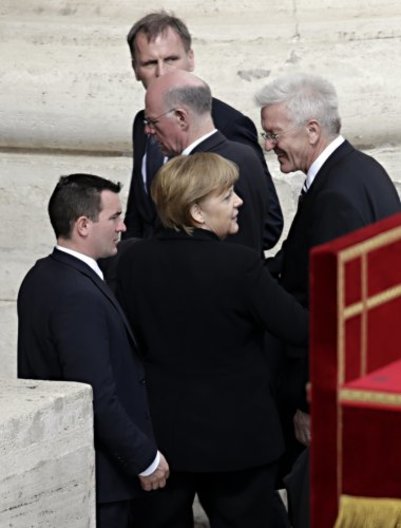Pope Francis' inauguration marked a historic moment in the Catholic Church's history, symbolizing a new era of leadership and reform. As the first pope from the Americas, Jorge Mario Bergoglio, known as Pope Francis, brought a fresh perspective to the Vatican. His election was not only significant for Catholics worldwide but also resonated globally due to his humble demeanor and commitment to social justice.
The global impact of Pope Francis' inauguration extended beyond religious boundaries, capturing the attention of world leaders and the general public alike. His dedication to addressing issues such as poverty, climate change, and interfaith dialogue set a tone of inclusivity and compassion. This pivotal event underscored the potential for spiritual leadership to influence and inspire positive change on a global scale.
Orthodox Hierarchs at the Inauguration
Among the notable attendees at the inauguration of Pope Francis was Metropolitan Tikhon, representing the Orthodox Church. His presence highlighted the growing ecumenical relations between the Catholic and Orthodox Churches. The participation of various Orthodox hierarchs signified a step towards unity and mutual understanding among Christian denominations.
This gathering of religious leaders demonstrated the importance of interfaith dialogue and cooperation. It provided an opportunity for open discussions on shared values and challenges faced by Christianity in the modern world. The attendance of Metropolitan Tikhon emphasized the significance of fostering relationships across different branches of Christianity.
Such events contribute to breaking down barriers and building bridges between communities that have historically been divided. By engaging in meaningful conversations, religious leaders can work together to address common concerns and promote peace and harmony globally.
A Modern Ceremony
Since the inauguration of Pope John Paul I, the traditional papal coronation ceremony has been replaced with a simpler inauguration mass. This change reflects the evolving nature of the Catholic Church and its adaptation to contemporary times. The inauguration of Pope Francis continued this tradition, focusing on simplicity and accessibility.
The decision to omit the elaborate coronation process underscores the Church's shift towards a more modest approach, aligning with Pope Francis' personal values and preferences. This choice resonates with many who appreciate a less ceremonial and more community-oriented style of leadership.
By prioritizing substance over spectacle, the modern inauguration ceremony allows for greater emphasis on the message and mission of the new pope. It serves as a reminder that the essence of leadership lies in service and humility rather than grandeur and display.
Pope Francis Prays for Global Leaders
Pope Francis extended his prayers and blessings to newly inaugurated leaders, including President Donald Trump. In a gesture of goodwill, he prayed for wisdom and strength for those entrusted with guiding their nations. This act exemplifies the pontiff's commitment to promoting peace and collaboration among world leaders.
His prayer for President Trump reflected a broader vision of supporting all individuals in positions of authority. By invoking divine guidance, Pope Francis aimed to foster an environment conducive to constructive dialogue and cooperation. Such gestures help bridge political divides and encourage mutual respect and understanding.
Through these actions, Pope Francis reinforces the importance of empathy and solidarity in leadership. His prayers serve as a call to action for leaders worldwide to prioritize the well-being of their people and the planet, embodying principles of justice and compassion.
First Words from the New Pontiff
In his inaugural speech, Pope Francis emphasized the need for unity and brotherhood among all peoples. Speaking from the balcony of St. Peter's Basilica, he urged everyone to pray for one another and for the entire world. His words carried a powerful message of hope and reconciliation.
The cardinal from Buenos Aires, now Pope Francis, expressed his desire for a world characterized by a strong sense of brotherhood. He encouraged believers to focus on fostering connections and breaking down walls that separate communities. This vision aligns with his lifelong dedication to serving marginalized populations.
His initial remarks set the tone for his papacy, highlighting themes of compassion, inclusion, and service. By advocating for a more interconnected and compassionate global community, Pope Francis inspires followers to embrace their roles as agents of change and peacebuilders.
Liturgy Booklet of the Inauguration Mass
The USCCB published a detailed booklet outlining the liturgical aspects of Pope Francis' inauguration mass. Held on the Solemnity of St. Joseph, the ceremony marked the beginning of the new pontiff's Petrine ministry. The booklet provided insights into the rituals and prayers conducted during this significant event.
This publication offered a comprehensive guide for participants and observers, ensuring they could fully engage with the spiritual significance of the occasion. It included reflections on the life and virtues of St. Joseph, whose patronage symbolizes protection and guidance for the Church.
By making such resources available, the USCCB facilitated a deeper understanding of the theological and pastoral dimensions of the inauguration. This effort reinforced the importance of education and awareness in strengthening faith communities worldwide.
Global Reactions to Leadership Changes
World leaders, including Vladimir Putin, responded to the inauguration of Donald Trump with messages of support and collaboration. These reactions illustrated the interconnectedness of global politics and the shared responsibility of maintaining international stability. Pope Francis also acknowledged the importance of diplomatic relations in achieving peace and prosperity.
As new administrations take office, it becomes crucial to establish channels of communication and cooperation. The responses from global figures like Putin and Pope Francis highlight the necessity of working together to tackle pressing global issues. Such dialogues foster an atmosphere of trust and partnership among nations.
By engaging in respectful exchanges, leaders can build upon existing alliances and create opportunities for growth and development. This approach ensures that diverse perspectives are considered and integrated into policy-making processes, leading to more effective and equitable solutions for global challenges.

